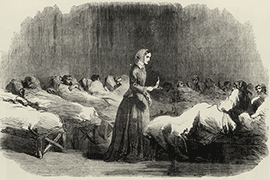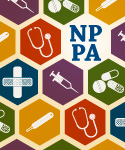May 18th, 2016
The Nurse In Me
Elizabeth Donahue, RN, MSN, NP-C
While there is plenty to celebrate during Nurses Week, including but not limited to care provided, research led, innovations generated, and compassion demonstrated by nurses, it is also a time for reflection. What is nursing? Why did I choose it and what does it mean to me?
 As a nurse practitioner, I am frequently caught between the worlds of nursing and medicine. I have the educational foundation and roots of a nurse. And yet, in my advanced practice role, I spend my time as a provider akin to my physician colleagues — assessing, diagnosing and planning for treatment. I often notice that I am feeling the strain of straddling two worlds — trying fervently not to let go of the identity that shaped me, but acknowledging that my role has changed and seeking to fit into a new reality. Not only that, but I have spent a significant amount of time defending my position in this provider world — touting my advanced training and independent licensing, my experience and my ability — and aiming to find my place, one that is respected and welcome. I imagine it’s not unlike what an immigrant to a new country feels like — identifying with and cherishing the traditions of their home while trying to assimilate to the culture in which they find themselves. Thankfully, that is not a struggle that I have ever had to endure, but one I know well from the stories of my patients and through many immigrants I have encountered through volunteer work.
As a nurse practitioner, I am frequently caught between the worlds of nursing and medicine. I have the educational foundation and roots of a nurse. And yet, in my advanced practice role, I spend my time as a provider akin to my physician colleagues — assessing, diagnosing and planning for treatment. I often notice that I am feeling the strain of straddling two worlds — trying fervently not to let go of the identity that shaped me, but acknowledging that my role has changed and seeking to fit into a new reality. Not only that, but I have spent a significant amount of time defending my position in this provider world — touting my advanced training and independent licensing, my experience and my ability — and aiming to find my place, one that is respected and welcome. I imagine it’s not unlike what an immigrant to a new country feels like — identifying with and cherishing the traditions of their home while trying to assimilate to the culture in which they find themselves. Thankfully, that is not a struggle that I have ever had to endure, but one I know well from the stories of my patients and through many immigrants I have encountered through volunteer work.
During the day-to-day provision of care, I find that it can be easy to let the nurse in me fade into the background while I wear my provider “hat.” I practice under the same conditions as my physician colleagues, that of shorter appointment slots than might be ideal, the pressure to enroll a certain number of new patients or meet an RVU target, the foreboding knowledge of the notes left to document or phone calls to return. It is all too natural to reduce the patients themselves to diagnoses waiting to be uncovered, chronic diseases needing management, checklists or tasks to be completed. I see this strain among the staff across disciplines in primary care — the front desk managing one more phone call, the medical assistants being asked to take on one more initiative, etc. By doing this, we can lose sight of the purpose of our work.
Thankfully, during the times when I have reached this lowest low of looking at patients as parts, the universe intervenes, and I am reminded of the “nurse” included in my title. Recently, a patient reflected on her visit, noting that she felt that something about her care was different. The way I explained her condition and instructed her made it seem easier to attain her goal. She said “maybe it’s because you are a nurse.” And I thought, yes, perhaps it is – because I am. Lately, as part of an initiative by our hospital nursing department, each day I receive an email with a reflection/reminder to practice in the way that nurse theorist Jean Watson intended when she scribed her “Philosophy and Science of Caring.” It has served as a daily reminder. When I am returned to my nursing roots, I am a better provider. I see the patient as a person again. I focus on their needs and their abilities. I realize that this endeavor toward health works better when patients see that I care and that I am their partner. I recognize the import of cura personalis, Latin for “care for the entire person,” a value stressed in my Jesuit education. I embrace the core values of caring, integrity, and excellence. And I can model this patient-centered attitude for all of my colleagues.
I am grateful to be a part of this wonderful profession called nursing. And I wish to use this Nurses Week to remind anyone in healthcare that we can better serve our patients when we truly view them and care for them as people. “The whole is greater than the sum of its parts,” per Aristotle; may we be cognizant of this principle not just during this special week but during all of those that come before and after it.

; [/php]/images/AU000_edonahue.jpg)

You do a fantastic job as do all of our nurse practitioners in my organisation. We could not manage the demand for outpatient clinic care and endoscopy without them in the UK. Keep it up.
Thanks Dr Dhar – it takes a team and works best when we work together.
Well said–Thanks for the reminder–wfh
Thanks for reading Wayne – and hope you’ll keep the reminders going for our colleagues!
Congratulations, great article and true !
Thank you Caroline.
Elizabeth – Your article helped remind me that I started my healthcare career as a member of the nursing staff before I was a member of the medical staff. Well said!
I truly appreciate your comments! Thank you for sharing your voice